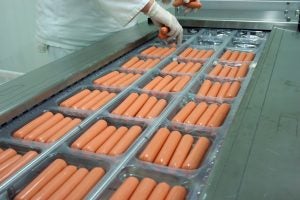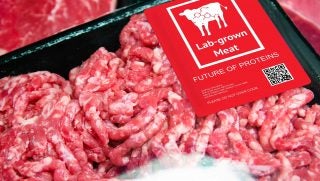A new legal advocacy hub called FarmSTAND — which is devoted “exclusively on dismantling industrial animal agriculture” — has launched today, with a former staff attorney for the Humane Society of the United States at its helm.
FarmSTAND has its roots as the Food Project at the Washington, D.C.-based legal group Public Justice and spun off from there, with Food Project director Jessica Culpepper segueing into the executive director role with FarmSTAND. Public Justice says that its mission is to “take on purveyors of corporate corruption, sexual abusers and harassers, and polluters who ravage the environment.”
FarmSTAND says it aims to mobilize a nationwide network of volunteer attorneys representing communities impacted by corporate agriculture and level the playing field for the “Davids” against the “Goliaths.” Food Project said it has gone toe-to-toe with CAFOs and meat companies such as Hormel Foods and Smithfield, and there are a wide range of $1 billion+ animal ag companies out there, from Organic Valley up to Cargill.
“We take on the largest and most powerful corporations in animal agriculture, such as big meatpackers, as well as the state and federal agencies and laws that favor big corporations over local workers, farmers and the environment,” the organization said in an email. It also said that its problem with larger-scale corporate animal agriculture is related to the exploitation of workers, externalizing the pollution costs of production onto people living near large facilities, and denying independent farmers and ranchers a fair chance to compete.
The launch of FarmSTAND is aligning with the introduction of the bipartisan Livestock Consolidation Research Act, which would direct the U.S. Department of Agriculture’s Economic Research Service to study the impact of consolidation in the livestock industry on farmers and producers, and subsequently, draft a report about how consolidation has affected new market entrants, access to resources and consumer purchasing power. The measure was brought forth by U.S. Reps. Randy Feenstra (R-Iowa) and Elissa Slotkin (D-Mich.).

In a news release, FarmSTAND explained that the movement emerged from community feedback about the lack of legal resources in the food and farm justice movement and the need for a new organization focused solely on the industrial animal agriculture system.
“Traditional litigation has delivered major victories by concentrating resources on certain cases that can change precedents, but this model hasn’t always addressed the immediate needs of the farmers, workers, and other communities most impacted by pollution and exploitation within our current system,” Culpepper said in a statement. “FarmSTAND works in courtrooms and communities to ensure that litigation supports the true goals of communities in the movement. We drive litigation and build power in communities so that together, we can advance a food system that is sustainable for all people and the planet.”
The COVID-19 pandemic exposed some of the shortfalls in the food system, and many experts blamed production and processing consolidation for that. When one company had a shutdown or delay, the ripple effect at times was massive.
When asking an independent agricultural lawyer about an organization like FarmSTAND, the response was: “Unlike most in the farming community, lawyers don’t automatically make me nervous. But I am a little uncomfortable when they start throwing around words like ‘industrial farming’ and ‘abuse of workers and animals.’ If this is a group that truly wants to work on behalf of farmers and rural communities, then that’s great. I just hope the use of these buzzwords isn’t a cover for some other agenda.”


